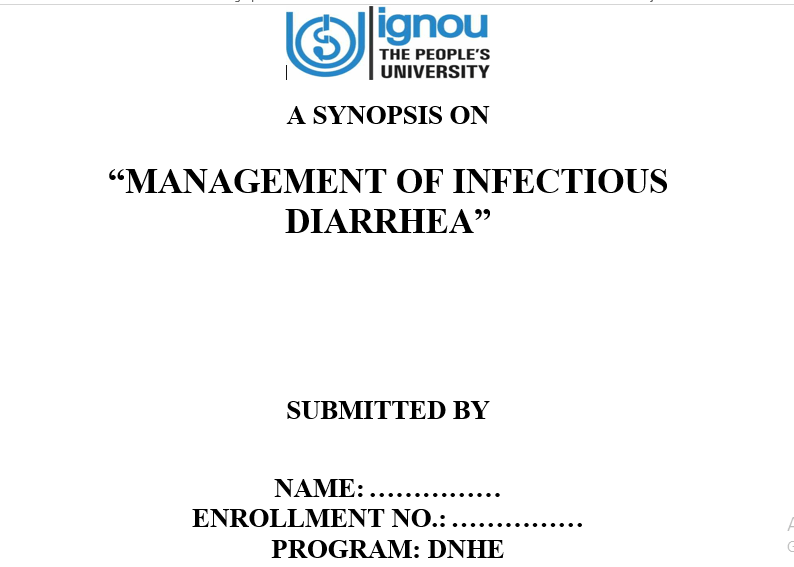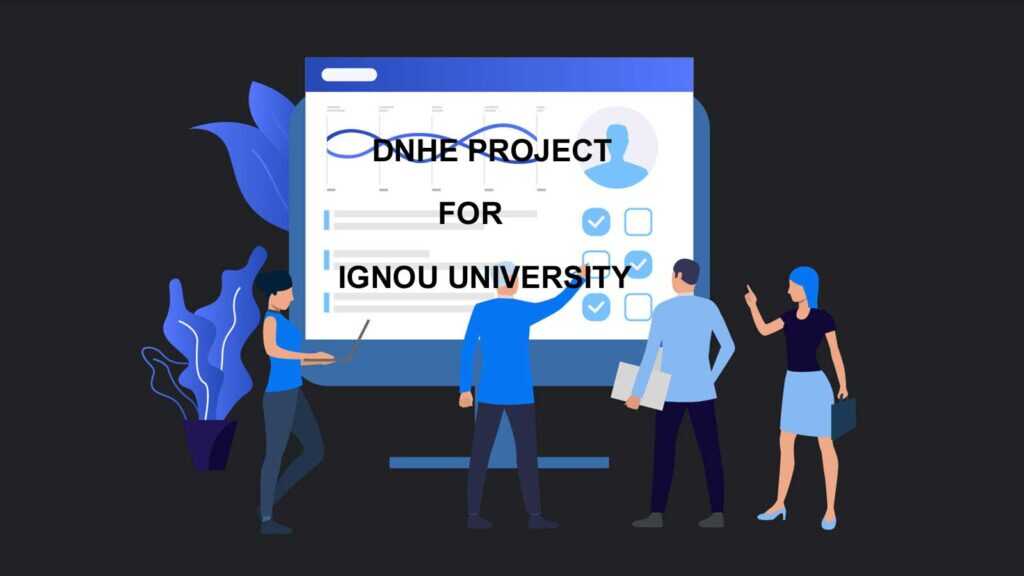IGNOU DNHE project is an essential component for students pursuing the Diploma in Nutrition and Health Education. This project serves as a culmination of their learning, offering practical experience in the field of nutrition and public health. This article will guide you through the process of completing your DNHE project work, from selecting a research topic to submitting your final report.
Composing a project requires time, effort and plenty of determination to cross the finishing line. It’s not an easy task, however, it doesn’t have to be to be a time taking experience. If you know the overall procedure for writing IGNOU DNHE 4 project, your journey will go much more smoothly.
The project will outline the process that will allow you to write a quality DNHE project proposal and report without getting lost in the route. If you’re only beginning your research and want to know how to compose DNHE project then keep in mind few thongs.
What is IGNOU DNHE 4 Project Work
The IGNOU DNHE 4 project work is an important research assignment for students enrolled in the Diploma in Nutrition and Health Education (DNHE). This project aims to test students’ understanding and application of nutrition science and public health practices. The project work requires students to engage in research, analysis, and problem-solving, providing an opportunity to put theory into practice.
The purpose of the DNHE 4 project work is not only to evaluate students’ understanding of nutrition science and health education but also to foster skills such as critical thinking, time management, and research methodology. By completing this project, students gain hands-on experience in conducting research that addresses public health and nutritional issues, a crucial aspect of their future roles as nutritionists and health educators.
Students are expected to:
-
Develop a research question or hypothesis related to a real-world nutrition or public health issue.
-
Conduct data collection and analysis using scientifically rigorous methods.
-
Present their findings in a structured report, demonstrating their ability to communicate complex ideas clearly.
This project also emphasizes the development of problem-solving skills, as students will often encounter challenges in the research process that require creative solutions. Additionally, the experience of writing the project report builds academic writing skills, which are essential for future professional or academic pursuits.
The IGNOU DNHE 4 project work is an integral part of the Diploma in Nutrition and Health Education, helping students bridge the gap between theory and practice, and preparing them for careers in nutrition science, public health, and health education.
Research Process Breakdown
Starting your IGNOU DNHE 4 project work might feel like a daunting task, but breaking it down into clear, actionable steps will make it an exciting and rewarding journey. Here’s how to approach it with confidence:
1. Define Your Research Questions:
Your research begins with a strong foundation—crafting focused, insightful questions. These will drive your project and ensure it remains aligned with the most pressing issues in nutrition and public health. The key is to keep it clear, specific, and impactful.
2. Review Existing Literature:
Before diving into new research, explore what’s already out there. Reviewing existing studies will sharpen your perspective and guide your approach, helping you identify gaps and areas ripe for discovery. It’s all about building on what others have started.
3. Choose a Research Methodology:
Now it’s time to select the right tools for the job. Whether it’s qualitative, quantitative, or a combination of both, your methodology is the blueprint for your research. Choose wisely, ensuring it matches your research questions and provides reliable results.
4. Conduct Original Research:
With your plan in place, it’s time to gather fresh insights. Conduct thorough and ethical research—whether through surveys, interviews, or experiments. This is where your creativity meets science, producing results that matter.
5. Analyze and Interpret Data:
Once your data is collected, it’s time to transform it into meaningful insights. Whether through statistical analysis or qualitative themes, this step allows you to see the bigger picture and answer your research question with confidence.
6. Draw Conclusions and Report Findings:
Now that you have your data, draw conclusions that offer real-world value. What impact do your findings have on the field of nutrition and public health? Clearly articulate these insights in your report, and show how your research contributes to the greater knowledge pool.
Importance of Choosing the Right Topic:
Choosing the right project topic is a game-changer for your DNHE 4 research. It’s the first step toward ensuring your work is impactful, focused, and aligned with your career goals. A well-defined topic doesn’t just shape your project—it’s the key to driving your research in the right direction and maximizing your learning. Here’s how to select the perfect topic with confidence:
1. Focus on Your Area of Interest:
When you’re passionate about your topic, the research process becomes far more enjoyable and meaningful. Pick a subject that excites you—whether it’s childhood nutrition, public health, or dietary habits. This enthusiasm will fuel your motivation and make your research journey rewarding.
2. Consider Relevance and Impact:
Your project should address current issues in the field of nutrition and health education. Relevance is key. Select a topic that not only sparks your curiosity but also contributes to the ongoing conversations in public health and nutrition. Ask yourself: What problem can you help solve? This mindset ensures that your research has real-world value.
3. Narrow Down and Refine Your Focus:
Once you have a general idea, it’s time to narrow down your focus. A broad topic can overwhelm you, while a narrow one may lack depth. Find the sweet spot by honing in on a specific aspect of a larger issue—this will help keep your research focused and manageable.
4. Ensure Feasibility:
Your chosen topic should be achievable given the time, resources, and data available. Consider practical aspects like access to participants, relevant data, and your own expertise in the subject. A well-thought-out topic should feel challenging yet within reach.
Choose the Most Unique IGNOU DNHE Project Topics

As we’ve seen the initial step in the process of research is to formulate a precise clear, well-constructed question. That is you have to choose the IGNOU DNHE Project topics that poses specific questions or sets of queries. All you need to do is come up with an issue or two, and you’ve got yourself a successful DNHE topic.
- NUTRITIONAL STATUS OF PRESCHOOL (1-3 YEARS) CHILDREN
- NUTRITION KNOWLEDGE ATTITUDE AND PRACTICES AMONG STUDENTS OF DELHI
- EFFECTS OF CHILDCARE PRACTICES ON THE NUTRITIONAL STATUS OF THE INFANTS OF WORKING MOTHERS ATTENDING DAYCARE CENTRES
- KAP (KNOWLEDGE, ATTITUDE AND PRACTICE) AMONG NUTRITION AND NON- NUTRITION STUDENTS
- A STUDY TO ANALYZE THE PREVALANCE OF OBESITY AMONG PRESCHOOL CHILDREN STUDYING IN GOVERNMENT AND PRIVATE SCHOOLS
- TO STUDY OF THE FACTORS INFLUENCING THE CHOICE OF FAMILY PLANNING MEASURES AMONG COUPLES
- TO STUDY THE FACTORS ASSOCIATED WITH CHILD OBESITY AMONG PRESCHOOL CHILDREN (AGED 2 TO 5 YEARS)
- A STUDY TO ANALYZE THE RELATIONSHIP BETWEEN MALNUTRITION AND INFECTION
- MANAGEMENT OF INFECTIOUS DIARRHEA
- PREVENTING AND CONTROLLING MICRONUTRIENT DEFICIENCIES
- TRADITIONAL FOODS FOR PREGNANT & LACTATING WOMEN & THEIR NUTRITIONAL SIGNIFICANCE
- A STUDY ABOUT MANAGEMENT OF DIABETES MELLITUS
IGNOUDNHE Project Topics 2024 25
- FOOD HABITS AND NUTRITION STATUS OF TIBETANS
- TRAINING MODULES FOR HYGIENE AWARENESS AMONG FOOD HANDLERS OF RESTAURANTS
- AWARENESS AND ATTITUDES OF FOOD SAFETY KNOWLEDGE AND PRACTICES OF CONSUMERS
- HEALTH AND NUTRITION – STUDY ON PRACTICES OF RURAL ADULTS
- IMPACT OF SOCIO ECONOMIC STATUS, NUTRITIONAL AWARENESS OF MOTHERS AND
- NUTRITIONAL STATUS ON THE COGNITIVE DEVELOPMENT OF THE PRE SCHOOL CHILDREN
- NUTRITIONAL AWARENESS AND PREFERENCES FOR READY TO EAT FOODS AMONGST WORKING
- AND NON WORKING WOMEN
- ASSESSMENT OF NUTRITIONAL STATUS OF ADULT DIABETIC WOMEN (35-60 YEARS)
- A STUDY ABOUT PREFERENCES FOR READY TO EAT FOODS AMONGST WORKING WOMEN
Write an Engaging IGNOU DNHE Solved Project Work
After you’ve identified an outstanding DNHE project topic, the next step is convincing your supervisor of DNHE course to let you conduct research on it. Whatever you believe your DNHE 4 topic is, it’s still going to need to be approved by the supervisor before you proceed writing your IGNOU DNHE solved project work. Your research plan is the instrument that you’ll need for this task.
Make an amount of words to count of DNHE Project Proposal
It is essential to write regularly to maintain consistency within your writing. Set a word count for yourself and meet it regularly. Whatever your schedule are, or the load of DNHE project proposal for the semester at university, you need to finish your word count each day.
Freewriting IGNOU DNHE 4 Project Work
If you think that you stuck at some point while writing your DNHE 4 project work, start free writing on the rough piece of paper. Write about whatever occurs to you. Do not be concerned about grammar mistakes, sentence structure and spelling errors during this writing time. This is to assist you to continue.
Proofreading
When you’re done writing your Ignou DNHE project, you should recheck the writing for spelling errors and grammar mistakes. It is possible to do this in conjunction with your writing process. After you have completed a page, you can put it down then return to the beginning and read it over again, looking for mistakes and correct them.
Why DNHE Project Synopsis is Important
For every student who is pursuing the DNHE course, the DNHE Project Synopsis is very important. Because during the making of Ignou DNHE project, students gain practical knowledge about their subject. During the time of projects, students do brainstorming and sharing different types of ideas and their knowledge.
Students of DNHE program work on different things and solve the problem of peoples regarding nutrition and health. They meet many types of peoples and solve their queries. In IGNOU Nutrition and Health Education Project, students not doing theory but practical also.
Ignou DNHE 4 Project work do not only increase the theoretical knowledge but also increase their problem solving skills and also increase the critical thinking and time management. With the help of the DNHE project synopsis project, they get job very easily.
The project increases the self-confidence of students when they present their project at external they increase confidence.
Ignou DNHE Course Details
| Course Type | Diploma |
| Eligibility | 12th pass |
| Min. Duration | 1 year |
| Max. Duration | 4 year |
| Fees | 2,000 |
| Package | 2.5 lakh to 5 lakh |
There are total four subjects and each subject has equal credit in DNHE course that is mention in given below table:
| Course Code | Name of the Course | Credits |
| DNHE-01 | Nutrition for the community | 8 credit |
| DNHE-02 | Public Health And Hygiene | 8 credit |
| DNHE-03 | Nutrition in Health Education | 8 credit |
| DNHE-04 | Project work | 8 credit |
The main goal of the DNHE course is to gain the knowledge base in nutrition and public health increase awareness regarding concept and principle in communication and it’s application in health education and nutrition. And playing the role of nutrition and health educators in their area.
Where to buy IGNOU DNHE Project Synopsis
It’s very difficult for students to make their DNHE Project. Because Ignou university provides a correspondence course only. In correspondence university students attends few classes that’s why they have not a proper knowledge of their subject. And students not getting good marks in their project. We are an Ignou project firm that helps the Ignou learners to complete their dissertation.
Our team has more than 40 plus members. We have experts who have written more than 10 thousand dnhe project synopsis for Ignou students having more than 10 plus years of experience.
Frequent Question Asked
Q -How to Download the DNHE Project Guide
Please click on the link to download Ignou DNHE project guide pdf.
Q – Where can I find the DNHE project Guidelines?
A – Click on the 1 questions answer link.
Q – Where and how to Send the Synopsis and Report of DNHE Project
A – You have to hard bind it and speed post to below is the Following
Address
DISCIPLINE OF NUTRITIONAL SCIENCES SCHOOL OF CONTINUING EDUCATION IGNOU COMPLEX, MAID AN GARHI, NEW DELHI-110 068

